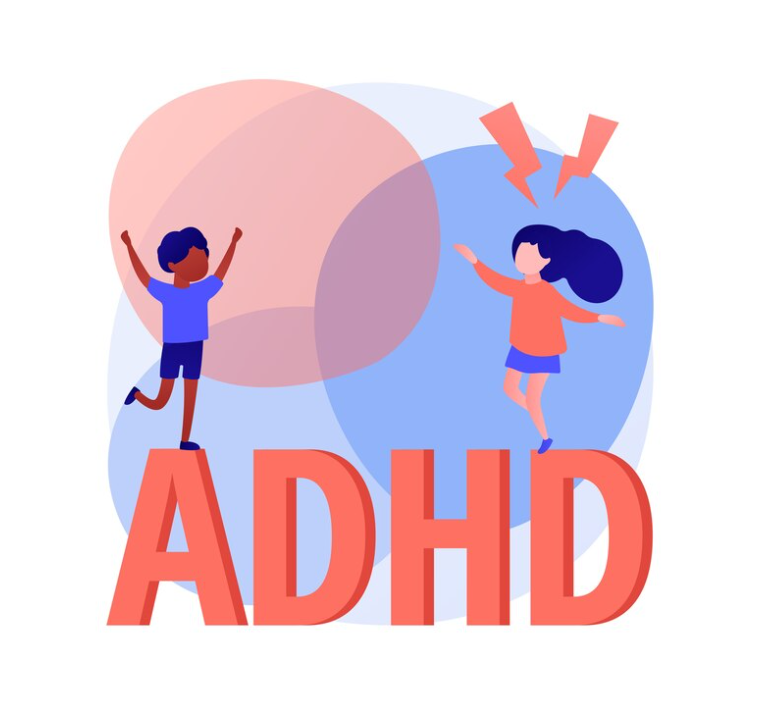Is There a Link Between ADHD and Addiction?
What is Attention Deficit Hyperactivity Disorder (ADHD)?
ADHD, or Attention Deficit Hyperactivity Disorder, is a neurodevelopmental disorder that affects both children and adults. It’s characterized by patterns of inattention, hyperactivity, and impulsivity that can interfere with daily functioning and overall quality of life. Symptoms often emerge in childhood but may persist into adulthood, creating challenges across many aspects of a person’s life.
Types of ADHD
- Predominantly Inattentive Presentation: Struggles with paying attention to details, sustaining focus, organizing tasks, and completing activities.
- Predominantly Hyperactive-Impulsive Presentation: Characterized by hyperactivity, restlessness, excessive talking, and impulsivity.
- Combined Presentation: A mix of inattentive and hyperactive-impulsive symptoms.
ADHD can have a variety of causes, including genetic, neurological, and environmental factors. Diagnosis typically involves a comprehensive assessment by healthcare professionals, often followed by therapy and sometimes medication.
Common Symptoms of ADHD
- Easily distracted
- Difficulty concentrating or completing tasks
- Poor organizational skills
- Interrupting others
- Fidgeting or restlessness
- Impulsive behavior
- Mood swings and forgetfulness
What Medications Are Typically Prescribed for ADHD?
ADHD treatment often involves a combination of behavioral therapy, counseling, and medications. The most commonly prescribed medications are:
Stimulant Medications
- Methylphenidate: Includes Ritalin, Concerta, and Daytrana.
- Amphetamines: Includes Adderall, Dexedrine, and Vyvanse.
Stimulants work by increasing dopamine and norepinephrine in the brain, improving focus and reducing impulsivity.
Non-Stimulant Medications
- Atomoxetine (Strattera): Affects norepinephrine levels and is often used when stimulants are ineffective or not well-tolerated.
- Guanfacine (Intuniv) and Clonidine (Kapvay): Used for their effects on hyperactivity and impulsivity.
Proper medication management, regular monitoring, and comprehensive treatment plans tailored to individual needs are essential for effective ADHD care.
The Potential Dangers of ADHD Medication
While ADHD medications are effective when used correctly, improper use can lead to serious risks:
- Health Risks: Increased heart rate, high blood pressure, insomnia, appetite suppression, and potential for substance abuse.
- Incorrect Dosages: Self-prescribing can lead to ineffective or dangerous dosages.
- Legal Consequences: Using prescription drugs without a valid prescription is illegal.
- Dependency and Withdrawal: Stimulants carry a risk of dependence and may lead to withdrawal symptoms when stopped abruptly.
Risk Factors for ADHD Medication Abuse
Some factors can increase the risk of ADHD medication misuse:
- Personal or family history of substance abuse
- Co-occurring mental health disorders (dual diagnosis)
- Peer pressure or academic stress
- Limited knowledge of medication risks
- Easy accessibility of ADHD medications
Are People With ADHD Prone to Addiction?
Research shows that individuals with ADHD have a higher risk of developing substance use disorders (SUDs). Impulsivity, a hallmark trait of ADHD, often leads to risk-taking behavior, including substance use. The pursuit of stimulation may also contribute to experimenting with drugs or alcohol, leading to dependence. Self-medication with substances to manage ADHD symptoms, like anxiety or impulsivity, can further complicate the risk.
ADHD Often Coexists With Addiction
A study by the National Institutes of Health found that nearly half of adults with ADHD have a co-occurring substance use disorder. Key findings included:
- Earlier onset of alcohol use disorder
- Higher rates of antisocial personality disorder
- Increased risk of suicidal ideation
ADHD and Addiction Statistics
- Approximately 5% of children and adolescents worldwide have ADHD, with prevalence decreasing to 2-3.5% in adults.
- 38% of individuals with cannabis use disorder also exhibit ADHD symptoms.
- 1 in 4 students report misusing ADHD medications.
How Impulse Control Contributes to the Problem
Poor impulse control is a major contributor to addiction among those with ADHD. Difficulty resisting urges, making risky decisions, and managing behaviors can lead to substance abuse and complications with sobriety.
Treatment Options For Co-Occurring ADHD and Substance Use
Ethical Medication Management: Proper management by healthcare professionals ensures safe and effective use of ADHD medications.
Dual-Diagnosis Programs: Integrating mental health and substance abuse treatment provides holistic care for individuals with ADHD and addiction. Behavioral therapies, like Cognitive Behavioral Therapy (CBT), are effective.
Inpatient and Outpatient Care:
- Inpatient Care: Provides intensive, structured support in a 24/7 setting.
- Outpatient Care: Offers flexible treatment while allowing individuals to maintain daily responsibilities.
Aftercare Programs: Ongoing support and monitoring post-treatment are crucial for sustained recovery.







